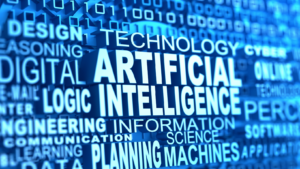In the ever-evolving realm of technology, one term stands out: artificial intelligence. But what’s in a name? As it turns out, plenty. The term ‘artificial intelligence’ is often cloaked in a variety of synonyms, each carrying its unique shade of meaning and context. This article will dive into the fascinating world of AI synonyms, exploring how they reflect the diverse applications and perspectives of this cutting-edge technology. From machine learning to cognitive computing, we’ll decipher the nuanced language of AI, enhancing our understanding of this transformative field. So, whether you’re a tech enthusiast or a curious novice, join us as we unravel the rich tapestry of terms that represent one of the most revolutionary innovations of our time – artificial intelligence.
Artificial Intelligence Synonyms

Artificial Intelligence (AI) has engendered a wide range of synonyms, reflecting its broad spectrum of applications and methodologies. In the academic realm, AI often goes by the name of “Machine Intelligence”. Businesses, on the other hand, might refer to it as “Business Automation” or “Process Automation.” Speaking of applications, “Cognitive Computing” usually describes AI implementations in understanding human behaviors, while scientists dealing with large datasets might simply call it “Data Mining”. To underscore the importance of new learning algorithms in AI, many refer to it as “Reinforcement Learning”.
No matter the term used, they all refer to the same overarching concept: the science and engineering of making machines intelligent. By understanding these synonyms, readers get an in-depth comprehension of the broad and varied field that artificial intelligence encompasses.
The Evolution of AI Terminology

Historically, evolving technologies sparked an evolution in AI terminology. In the early 1950s, the term “Machine Intelligence” emerged, reflecting the pioneering work within academia to develop intelligent machines. Since then, with the expansion of AI’s applications, new synonyms started taking form. The rise of the business sector saw the rise of terms like “Business Automation” and “Process Automation,” highlighting AI’s role in streamlining operations and increasing productivity.
The mid-1990s birthed “Cognitive Computing” as AI explored the realm of mimicking human behaviors. The surge of data generation led to the term “Data Mining,” demonstrating AI’s capacity to handle large datasets. During this time, “Reinforcement Learning” surfaced, emphasizing the advent of AI learning algorithms. Over the years, these robust terminologies fused together to represent the idea of creating intelligent machines through science and, effectively portraying the ever-evolving landscape of AI.
Impact of Different AI Synonyms on Public Perception
The chronology of AI terminology, extending from “Machine Intelligence” in academia to “Business automation” within industry, has wielded substantial influence on public perception. Increasingly sophisticated terms like “Cognitive Computing”, “Data Mining” and “Reinforcement Learning” lend gravitas to the technology. They’re instrumental in igniting curiosity among the public, while simultaneously fostering trust in AI’s advancing capabilities.

A case in point: “Cognitive Computing”. This label demonstrates AI’s aspiration to mimic human thought processes. The very usage of “Cognitive”, encompassing realm of human understanding, drives the perception that AI is a near-peer to humanity. It shifts AI from a mere data processor to an innovator and thinker.
Yet, terms like “Business Automation” and “Process Automation”, while reinforcing AI’s practical applications, can also breed stereotypes. These depict AI merely as a tool for reducing human labor or delegating repetitive tasks, potentially limiting public understanding of AI’s broader capabilities.
In essence, every AI synonym carries palpable implications for AI acceptance, underscoring the need for careful, context-sensitive usage.
Future of AI Naming Conventions
The evolution of AI terminology has been as dynamic as the technology itself. It’s clear that terms like “Cognitive Computing” and “Business Automation” don’t just label AI; they shape its perception and acceptance. As AI continues its forward march, the nomenclature will undoubtedly evolve alongside it. The challenge for academia and industry is to ensure these terms accurately reflect AI’s capabilities without limiting its potential in the public’s eye. Thoughtful naming conventions can help bridge the gap between AI’s complex reality and public understanding. It’s a delicate balance, but one that’s essential for the future of AI.



